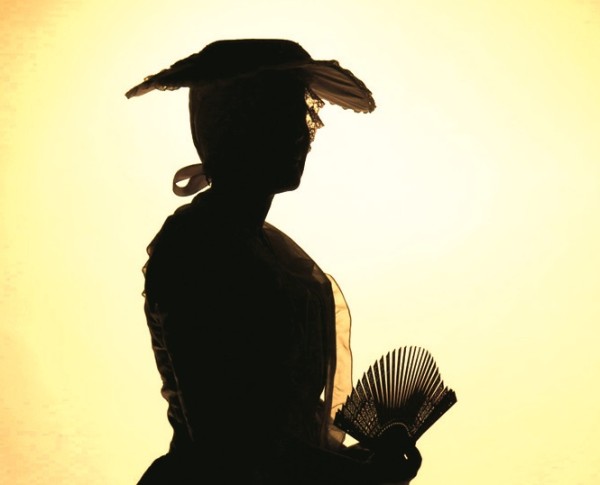 You may have heard the saying “Behind every great man, is a woman rolling her eyes.” There are dozens of other versions of this quote, and we all know that men (successful or not!) did not arrive to that point on their own—someone gave birth to them.
You may have heard the saying “Behind every great man, is a woman rolling her eyes.” There are dozens of other versions of this quote, and we all know that men (successful or not!) did not arrive to that point on their own—someone gave birth to them.
Somewhere between these two ideas is what I found myself pondering as I thought about the role of Women’s History in Colonial Williamsburg. We have some incredible, powerful programming that we rolled out last month, highlighting working women of Williamsburg, women and the law, American Indian women, and so much more. We are constantly trying to reimagine the way in which we present our history to the public, to ensure that we focus on all of the stories, and not just the men whose names we know from textbooks. It’s a wonderful thing to be able to focus our programming on the lesser-known history, and there are a myriad of ways in which we can relate these stories to those events in history ingrained in our earliest educational memory. But I got to thinking about the early lives of the great men of Williamsburg? What about the women who were most influential in the beginning of their stories?
In 18th-century Virginia, it was common for your education to be that befitting your station. If you were a dirt farmer, more than likely the majority of your children’s education was going to center on those things necessary to become a successful farmer—and hopefully a little more successful than your parents before you. That is an age-old desire. Everyone wishes the best for their children and tries to give the greatest tools possible for success.
In the 1700s, early education tended to occur mostly in the home. Depending on your position, a tutor, a governess, or perhaps even a boarding school became the primary source of learning. So the obvious answer concerning which women were most influential in the early lives of our great men of Williamsburg would be their mothers and other family matriarchs. And who to speak better to the influences of Mrs. Henry, Jefferson, or Washington, than their sons themselves. Or at least the men who portray them.
Patrick Henry’s mother, Sarah Winston Syme Henry
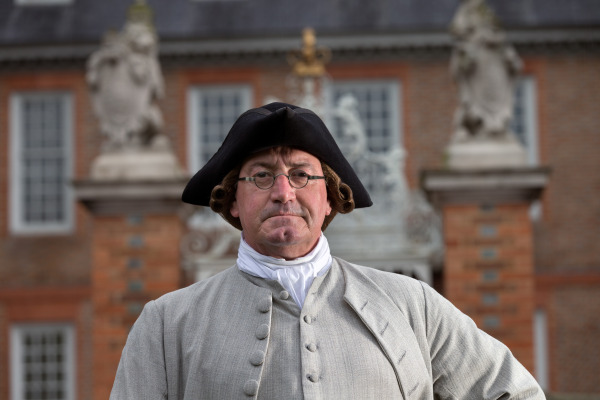
Born around 1709 in Hanover, Virginia, to Isaac Winston and Mary Dabney Winston, Sarah was first married to Colonel John Syme, by whom she had one son. In 1734, she married her second husband John Henry, and together they had eleven children, including their second son, Patrick Henry. She died in 1784, and while we may not know much specifically about her, it is interesting to ponder what she must have thought while watching her third-born son rise to such popularity and named status, and become the first Governor of the Commonwealth. What might her influence have been on her son?
Richard Schumann, who embodies Colonial Williamsburg’s Patrick Henry, believes that one of Henry’s biographers, Robert Douthat Meade, puts it well: “It is often stated that great men are more influenced by their mothers than their fathers. The evidence is hardly conclusive in the cases of George Washington and Thomas Jefferson. But, on the whole, Sarah Henry seemed a stronger character than Patrick’s father, Colonel John Henry, and Patrick derived more from her than from his father. In her final years, there was no great indication of her sprightliness with which, as a young widow, had attracted the attention of William Byrd II. Instead, she was known especially for her amiability and Christian qualities. From her, Patrick inherited much of his piety, intelligence, and firmness of character. There was also an oratorical strain…in her paternal family, the Winstons, and this was handed down to her distinguished son.”
Thomas Jefferson’s Mother, Jane Randolph Jefferson
Jane Randolph Jefferson was born in 1721 in London, to Isham Randolph and Jane Rogers. The Randolphs departed for Virginia shortly after, and were in Williamsburg by 1725. Her grandfather was William Randolph, and the large family had extensive holdings in Virginia well before this granddaughter arrived in the colony. Although the Randolph family was known throughout 18th-century Virginia to be quite wealthy and influential, according to Monticello’s research, Jane brought a rather modest dowry to her marriage to Colonel Peter Jefferson in 1739. Mrs. Jefferson gave birth to ten children, including their eldest son, Thomas, before her husband died in 1757, leaving Jane a widow at age 36 to raise her family.
Bill Barker, who brings Thomas Jefferson to life every day for visitors, shares his thoughts on Jane Randolph Jefferson, and her influence on her son.
“We know that Mrs. Peter Jefferson died quite suddenly at the age of 55 on the last day in March, 1776, just as her son was preparing to leave Monticello for the Second Congress in Philadelphia. We know TJ, himself, notes that he fell ill for nearly three weeks after his mother’s death and did not depart for Philly until he felt fully recovered. Of course, when he finally arrived in Congress the next few months witnessed the extraordinary move towards the vote for Independency and the penning of the Declaration of Independence,” says Barker.
He goes in to say, “My personal thoughts upon the influence of Thomas Jefferson’s mother in his life lean very much to her decided influence upon him towards goodness, gentility of manners, and nobility of thought. As her eldest son, he held a mother’s deep regard for depending upon him more than upon her younger children. She also must have had an exceptionally open and curious mind. That trait of a mother more often comes out in an eldest son. I know many historians feel Jane Randolph Jefferson may have been too overbearing upon her son and that is the reason TJ hardly refers to her in his writings. I do not believe that. Happily, Susan Kern, Professor at William & Mary, and author of “The Peter Jefferson family of Shadwell”, feels the same as I do. A mother, herself, she sees a deep maternal love expressed in TJ’s silence upon his mother’s influence in his life,” reflects Bill.
Marquis de Lafayette’ Grandmother, Marie Catherine de Suat de Chavagnac
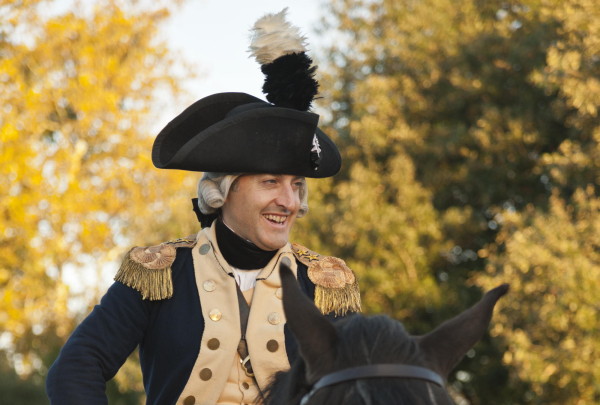
Unfortunately, Lafayette’s father died before he was two, and his mother moved to Paris, leaving Lafayette to be raised by his Aunts and Grandmother until the age of twelve. His mother died shortly after he joined her in Paris, and his grandfather shortly after that, leaving the wealthy young Marquis to be raised by his Grandmother, Mme de Chavaniac.
Mark Schneider, who portrays the energetic young Marquis de Lafayette, feels that Harlow Unger makes a wonderful statement regarding Mme de Chavaniac: “her unbridled love gave him free reign to romp about the chateau grounds, his unruly red hair flailing, his wooden sword slashing at imaginary British villains lurking behind the corner towers.” Mark says, “she was considered a woman of the highest character and well-respected throughout the region, showing great kindness and generosity to all. A great and influential woman to Lafayette indeed!”
James Madison’s Grandmother, Frances Madison
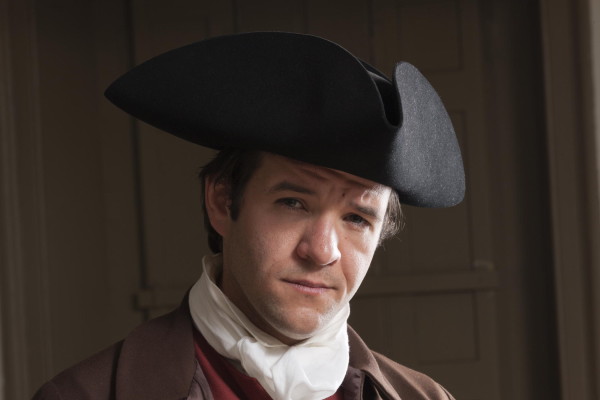
Frances Taylor was born at the turn of the century, 1700, to James and Martha Thompson Taylor. In 1721, she married Ambrose Madison, a well-established member of the gentry class. Together they had three children, including James. In 1732, Ambrose died, leaving Frances a widow to run the estate in Orange County and co-manage it with her only son until he came of age. And it seems that she did quite well, petitioning for the building of roads, supervising tobacco rotations, and even appealing and then winning a civil suit her husband had lost. While Frances Madison only had 10 short years with her grandson James Jr., she was certainly a formidable woman, and most assuredly made an impact.
Colonial Williamsburg’s James Madison, Bryan Austin, states that “Shortly before she died, Frances gave James a commonplace book. A sort of journal/notebook for his education that Madison kept all through his elementary and higher years of education. It’s a valuable asset to Madison scholars seeking insight to young James’ mind and the curriculum he studied.” Frances, along with James’ mother Eleanor, were undoubtedly the earliest educators to young James, and set “shining examples of rising above the limitations and authorities time and society placed upon you.”
It is obvious that strong female figures did not scare, but rather inspired Madison, especially when you consider his choice of wife in the illustrious and influential Dolley (but that’s a blog in and of itself!)
Bryan says, “Can it be any wonder that, with women such as these in Madison’s life, that when in 1821 Albert Picket asked him about a system of education of females Madison responded, ‘The capacity of the female mind for studies of the highest order cannot be doubted, having been sufficiently illustrated by its works of genius, of erudition and of Science.’ I don’t think I could put it better, myself.”
George Washington’s Mother, Mary Ball Washington
Mary Ball was born in the early 1700s in Lancaster County, Virginia, to Joseph and Mary Ball. She lost both of her parents at an early age. Her father died when she was just a few years old, and her mother passed by the time Mary turned 13. She was raised by her two half-sisters and her guardian Colonel George Eskridge. She married Augustine Washington in 1731, and they settled in Westmoreland County to raise Augustine’s three children from a previous marriage, and to grow their own family. When Augustine died suddenly in 1743, Mary was left a widow at the young age of 35. She had five children under the age of 12, including her eldest son, George. She managed several hundred acres while raising her children, and never remarried. Mary lived through the tumult of the Revolutionary War, and died in August of 1789. It was just a few short months after the inauguration of her eldest son as the first President of the United States of America. What must she have thought of that? There are conflicting presumptions.
“My mother was the most beautiful woman I ever saw. All I am I owe to my mother. I attribute all my success in life to the moral, intellectual, and physical education I received from her.”
While this is probably the most well-known quote regarding George Washington’s mother, as far as research can tell, they are not actually his own words, but something put forth in a Daughters of the American Revolution publication from the 1930s.
Ron Carnegie, who portrays the General for Colonial Williamsburg, provides a different perspective.
“Washington’s relationship to his mother was NOT an easy one. Mary Ball Washington was a curious woman. Deified in the 19th century and demonized in the 20th. She was stern and tight with money. She appears to have expected a great deal of duty from her children and failed to ever recognize their achievements. Some historians also consider her overprotective. As a youth, Washington’s friends were afraid of her and as soon as he could George himself seems to have raced away from her. Washington never came to this conclusion, but I believe that his own force of will, his good health and longevity are all due to his mother’s influence on him.”
The women who have influenced our Founders are incredible—each in her own way. Relationships are always messy, and it is certainly never an easy thing to try to look back through history to find the pieces that fit together to create a portrait of someone with very little written by—or about—them. But I do hope that this post has given you some insight into just a few of those women who are often a footnote to history.
A huge thank you to all of those who contributed to help us take a look at the significant women who (in my opinion) would not be rolling their eyes, but beaming proudly. As we listen to our founding fathers, read their documents, and remember their words, let us never forget, in the words of Abigail Adams, and a previous Colonial Williamsburg program, to “Remember the Ladies” and also to remember the Women Who Made Them.
GUEST BLOGGER: WHITNEY THORNBERRY
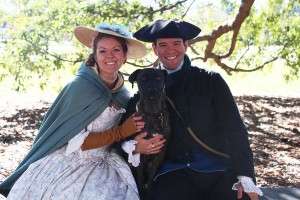 Whitney is a Sites Interpreter who has been with the Foundation full time since March of 2015. She and her Fiance, Bryan, live in the Historic Area with their rescued pup Derby (a sweet girl of 3 who thinks the horses are just big dogs to play with) and they are looking forward to their impending nuptials this month!
Whitney is a Sites Interpreter who has been with the Foundation full time since March of 2015. She and her Fiance, Bryan, live in the Historic Area with their rescued pup Derby (a sweet girl of 3 who thinks the horses are just big dogs to play with) and they are looking forward to their impending nuptials this month!
Whitney loves hosting dinner parties, sewing, reading, distressing furniture, science fiction, historical dramas, old movies and anything from the Williamsburg Winery. Her mother used to say she was born in the wrong century—and now she gets the best of both!
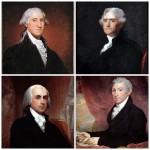

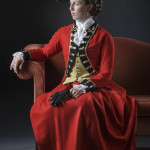
Thank You Mr. Barker for sharing your thoughts and insights regarding Mr. Jefferson’s relationship with his mother as well as her influence in his life. I had thought that he flourished under his mother’s guidance especially as he lost his father at such a young age. After reading a biography of Thomas Jefferson ( Thomas Jefferson A Life) , I came away with an unsettling feeling that he held a distinct animosity toward his mother. I would rather believe that this is not the case.
Informative post. Thanks.
I have had the pleasure of coming to Williamsburg every year for the past dozen or so. With each visit I see the narrative deepening and widening. This blog reminds me of the depth of research done by the first-person interpreters, and of their dedication to their roles. “Bravo!” to all. I do look forward to meeting Mrs. Washington when next I am in Williamsburg. In future will I meet Mrs. Madison? I fear meeting Mrs. Patrick Henry may be a bit of a challenge, from what I know of the lady.
On a different head, will your readers be seeing a blog on the stories of the young women who are apprentices in what might be thought of as men’s careers? I am thinking in particular of blacksmithing and joinery.